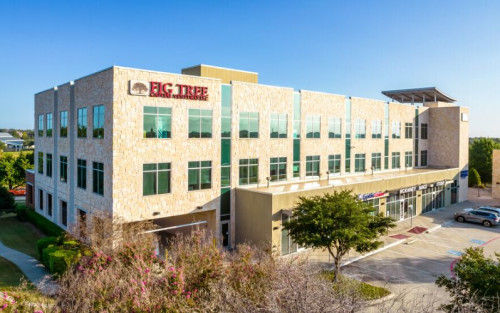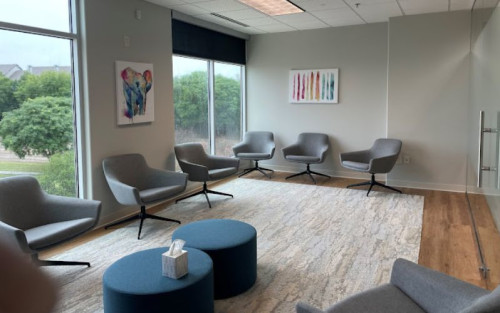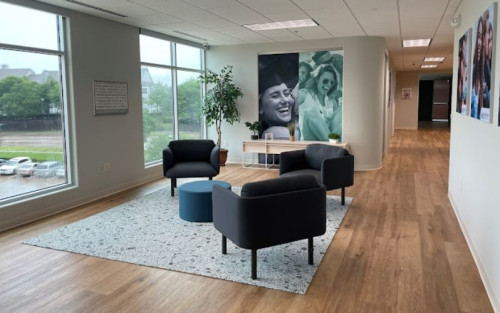





Connections Wellness Group McKinney
Treatment Focus
This center treats substance use disorders and mental health conditions. You'll receive individualized care catered to your unique situation and diagnosis, learn practical skills for recovery, and make new connections in a restorative environment.
Primary Level of Care
Outpatient treatment offers flexible therapeutic and medical care without the need to stay overnight in a hospital or inpatient facility. Some centers offer intensive outpatient program (IOP), which falls between inpatient care and traditional outpatient service.
This provider hasn't verified their profile's information. Are you the owner of this center? Claim your listing to better manage your presence on Recovery.com.
Treatment Focus
This center treats substance use disorders and mental health conditions. You'll receive individualized care catered to your unique situation and diagnosis, learn practical skills for recovery, and make new connections in a restorative environment.
Primary Level of Care
Outpatient treatment offers flexible therapeutic and medical care without the need to stay overnight in a hospital or inpatient facility. Some centers offer intensive outpatient program (IOP), which falls between inpatient care and traditional outpatient service.
Provider's Policy
Our services are competitively priced, and we are in-network with most major insurance companies.
Connections Wellness Group McKinney
Connections Wellness Group McKinney
About Connections Wellness Group McKinney
Connections Wellness Group in McKinney, Texas works to connect individuals and families in McKinney with mental health services, including crisis care, medication management, and therapy. They offer same-day appointments for psychiatric care and can treat patients in need of dual diagnosis, secondary substance use disorder, depression, or anxiety treatment. Other treatment options include psychiatric evaluation and medication management, group therapy, expressive therapies, family support, academic instruction and school support, case management, and aftercare planning.
Intensive Outpatient Program (IOP)
Connections Wellness Group McKinney offers IOPs for veterans and adolescents. The veterans program is offered Monday-Friday 9am-1pm and is called “The Front Line,” where veterans and first responders can connect with peers and receive targeted treatment. During treatment, clients will have individualized treatment plans, focus on trauma as well as recovery, and have treatment options of evidence-based therapies and holistic approaches. The adolescent general IOP is offered Monday-Friday 9am-3pm. The IOPs consists of 3 hours of group therapy per day that includes process groups, psychoeducational groups, experiential groups, and nursing groups. In addition, individuals will receive medication management and medication education. The program is typically 4-6 weeks long. At the end of treatment, clinical staff will collaborate with patients on an aftercare plan.
Partial Hospitalization Program (PHP)
The Front Line Veterans PHP is Monday-Friday 9am-1pm and the adolescent PHP is Monday-Friday 9am-3pm. The PHPs typically consist of 4 hours of group therapy per day and includes process groups, psychoeducation groups, and experiential groups. Individuals can receive a psychiatric evaluation, medication management, medication education, case management, and family support through the program. Adolescents enrolled in secondary education can receive academic support and instruction during the PHP.
Adolescent Dual Diagnosis/Substance Use PHP
The adolescent dual diagnosis PHP is like the general adolescent PHP, but focuses on treating individuals with a substance use disorder and another mental health concern. Connections Wellness Group aims to decrease the likelihood of relapse by treating the whole person, and not just one aspect of their illness. Therapists are trained and certified in SMART recovery facilitation and techniques and will use a holistic approach and evidence-based therapies during treatment. This program at the McKinney, Texas location is offered Monday-Friday 9am-3pm.
Academic Support and Instruction
Connections Wellness Group's academic program is designed to complement the therapeutic care that students receive while in treatment. Their academic program is Cognia-accredited meaning all grades received during treatment are fully transferable to any school in any state. Students may also receive school credits while attending the program. There is no additional cost for students and families who use this program during treatment.
Center Overview
Treatment Focus
This center treats substance use disorders and mental health conditions. You'll receive individualized care catered to your unique situation and diagnosis, learn practical skills for recovery, and make new connections in a restorative environment.
Joint Commission Accredited
The Joint Commission accreditation is a voluntary, objective process that evaluates and accredits healthcare organizations (like treatment centers) based on performance standards designed to improve quality and safety for patients. To be accredited means the treatment center has been found to meet the Commission's standards for quality and safety in patient care.

Insurance Accepted
Cash Pay Rates
Estimated Cash Pay Rate
Center pricing can vary based on program and length of stay. Contact the center for more information. Recovery.com strives for price transparency so you can make an informed decision.
Levels of Care








Your Care Options
Specializations
Adolescents
Teens receive the treatment they need for mental health disorders and addiction, with the added support of educational and vocational services.
Who We Treat
Veterans
Patients who completed active military duty receive specialized treatment focused on trauma, grief, loss, and finding a new work-life balance.
Adolescents
Teens receive the treatment they need for mental health disorders and addiction, with the added support of educational and vocational services.
Children
Treatment for children incorporates the psychiatric care they need and education, often led by on-site teachers to keep children on track with school.
Approaches
Evidence-Based
A combination of scientifically rooted therapies and treatments make up evidence-based care, defined by their measured and proven results.
Individual Treatment
Individual care meets the needs of each patient, using personalized treatment to provide them the most relevant care and greatest chance of success.
Therapies
1-on-1 Counseling
Patient and therapist meet 1-on-1 to work through difficult emotions and behavioral challenges in a personal, private setting.
Family Therapy
Family therapy addresses group dynamics within a family system, with a focus on improving communication and interrupting unhealthy relationship patterns.
Acceptance and Commitment Therapy (ACT)
This cognitive behavioral therapy teaches patients to accept challenging feelings and make the appropriate changes to reach personal goals.
Psychoeducation
This method combines treatment with education, teaching patients about different paths toward recovery. This empowers them to make more effective decisions.
Art Therapy
Visual art invites patients to examine the emotions within their work, focusing on the process of creativity and its gentle therapeutic power.
Solution Focused, Goal-Oriented Therapy
A quick goal-oriented therapy that helps patients identify their current and future goals, find out how to achieve them, and empower future problem-solving.
Conditions We Treat
Anxiety
Anxiety is a common mental health condition that can include excessive worry, panic attacks, physical tension, and increased blood pressure.
Depression
Symptoms of depression may include fatigue, a sense of numbness, and loss of interest in activities. This condition can range from mild to severe.
Grief and Loss
Grief is a natural reaction to loss, but severe grief can interfere with your ability to function. You can get treatment for this condition.
Stress
Stress is a natural reaction to challenges, and it can even help you adapt. However, chronic stress can cause physical and mental health issues.
Trauma
Some traumatic events are so disturbing that they cause long-term mental health problems. Those ongoing issues can also be referred to as "trauma."
Self-Harm
The act of intentionally harming oneself, also called self-injury, is associated with mental health issues like depression.
Anger
Although anger itself isn't a disorder, it can get out of hand. If this feeling interferes with your relationships and daily functioning, treatment can help.
Substances We Treat
Co-Occurring Disorders
A person with multiple mental health diagnoses, such as addiction and depression, has co-occurring disorders also called dual diagnosis.
Drug Addiction
Drug addiction is the excessive and repetitive use of substances, despite harmful consequences to a person's life, health, and relationships.
Alcohol
Using alcohol as a coping mechanism, or drinking excessively throughout the week, signals an alcohol use disorder.
Languages






